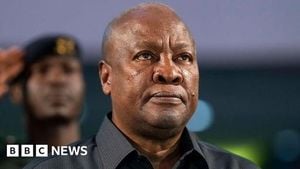On the afternoon of September 10, 2025, the campus of Utah Valley University in Orem, Utah, was suddenly thrust into chaos and tragedy. Charlie Kirk, the 31-year-old conservative activist and co-founder of Turning Point USA, was shot and killed during a campus debate, an event that has since reverberated through the nation’s political landscape and ignited fierce debate about the state of political violence in America.
According to the Associated Press, Kirk was participating in a debate hosted by his nonprofit political organization as part of the first stop on his “The American Comeback Tour.” The event, held under a white tent in the Sorensen Center courtyard, was marked by a tense exchange about mass shootings and gun violence just moments before the attack. As Kirk responded to a question about the number of mass shootings by transgender Americans, a single shot rang out. Witnesses reported seeing Kirk reach for his neck as blood poured from a wound on his left side, and panic swept through the crowd as attendees screamed and ran for cover.
Utah Governor Spencer Cox wasted no time in characterizing the attack. “This is a dark day for our state. It’s a tragic day for our nation,” Cox said, calling the shooting a “political assassination” and promising that the perpetrator would be held accountable in a state where the death penalty remains on the books. The shooter, dressed in dark clothing, had fired from a rooftop some distance away, according to law enforcement accounts cited by the Associated Press.
Confusion initially surrounded the search for a suspect. FBI Director Kash Patel posted on social media that a “subject” had been taken into custody, but later clarified that the person had been released after questioning. Utah authorities said a person of interest was in custody, but did not clarify if this was the same individual. As of the article’s publication, no suspect or motive had been officially identified, and the campus remained closed with classes canceled until further notice. Police continued to canvass the surrounding neighborhood, seeking information and showing residents a photo of a person of interest.
The shooting drew swift and widespread condemnation from across the political spectrum. President Donald Trump, a close ally of Kirk’s, announced the activist’s death on social media, describing Kirk as “Great, and even Legendary.” Trump added, “No one understood or had the Heart of the Youth in the United States of America better than Charlie.” The president ordered flags lowered to half-staff and issued a presidential proclamation in Kirk’s honor.
Democratic officials also condemned the violence. California Governor Gavin Newsom, who had previously hosted Kirk on his podcast, called the attack “disgusting, vile, and reprehensible.” Former Congresswoman Gabrielle Giffords, herself a survivor of political violence, wrote, “The murder of Charlie Kirk breaks my heart. My deepest sympathies are with his wife, two young children, and friends.” Illinois Governor JB Pritzker echoed the sentiment, stating, “Political violence has no place in this country and should never become the norm.” Michigan Governor Gretchen Whitmer, who survived a kidnapping plot in 2020, urged Americans to stand up against all forms of political violence.
For many, the assassination of Kirk felt like the latest chapter in a grim trend. The Associated Press noted that the United States has seen a spike in political violence in recent years, affecting people across the ideological spectrum. High-profile incidents include the assassination of a Minnesota state lawmaker and her husband, the firebombing of a Colorado parade, and the attempted kidnapping of Governor Whitmer. Perhaps most notably, former President Trump himself survived an assassination attempt during a campaign rally the previous year.
Kirk’s influence in conservative circles was substantial. He founded Turning Point USA in suburban Chicago in 2012 at just 18 years old, with the goal of advocating for low taxes and limited government on college campuses. Though the organization struggled at first, Kirk’s confrontational style and willingness to engage in heated debates eventually won over major conservative donors. By the time Trump clinched the GOP nomination in 2016, Turning Point was firmly in Trump’s corner, and Kirk became a regular presence on cable news, championing the culture wars and praising the president. He also served as a personal aide to Donald Trump Jr. during the 2016 campaign, further cementing his ties to the Trump family.
The event at Utah Valley University had already been the subject of controversy before the shooting. An online petition calling for Kirk to be barred from appearing at the university garnered nearly 1,000 signatures. However, the university cited First Amendment rights and affirmed its commitment to free speech and intellectual inquiry. Kirk himself seemed to relish the controversy, posting on social media, “What’s going on in Utah?” alongside news clips about the debate.
In the wake of Kirk’s death, President Trump delivered an Oval Office address that quickly became a lightning rod for criticism. As reported by Raw Story, Trump placed blame for Kirk’s murder squarely on Democrats, accusing them of comparing “wonderful Americans like Charlie to Nazis and the world’s worst mass murderers and criminals.” He argued that such rhetoric was “directly responsible for the terrorism that we’re seeing in our country today, and it must stop right now.” Notably, Trump did not mention recent incidents of right-wing violence against Democrats in his call to end political violence.
The president’s remarks set off a firestorm online. “What an absolutely disgusting speech from the Oval Office,” the group Republicans Against Trump wrote on X, calling Trump “truly incapable of uniting the American people, even in times of tragedy.” Political commentators also pointed out that Trump’s address omitted references to the January 6th attack on the Capitol, the attack on the Pelosi family, the Hortman murders, the attempted kidnapping of Governor Whitmer, and the fire at Governor Shapiro’s house. Alan Eyre, a distinguished diplomatic fellow at the Middle East Institute, weighed in: “The issue is primarily gun violence, not political violence. Every country has political factions, but only the US has this many deaths by guns.”
Other voices offered their own perspectives. Political analyst Vikas Sai remarked, “Charlie Kirk was defending political violence committed by Israel & white fundamentalist of USA. He became a victim of the same.” Nicholas Grossman, a professor of international relations at the University of Illinois, added on Bluesky, “Trump lying in an Oval Office address that Charlie Kirk’s killing was caused by people comparing him and his organization to Nazis—lying because he has no idea, but declared it anyway—pairs interestingly with some prominent Trump fans saying they hope this can be their Reichstag Fire.”
As the investigation continues and the nation grapples with the implications of Kirk’s assassination, the debate over political rhetoric, gun violence, and the boundaries of free speech remains as heated as ever. The tragedy at Utah Valley University has left a deep scar—a reminder of the dangers that can arise when political grievances turn deadly, and a call for Americans to reckon with the forces fueling division and violence.



